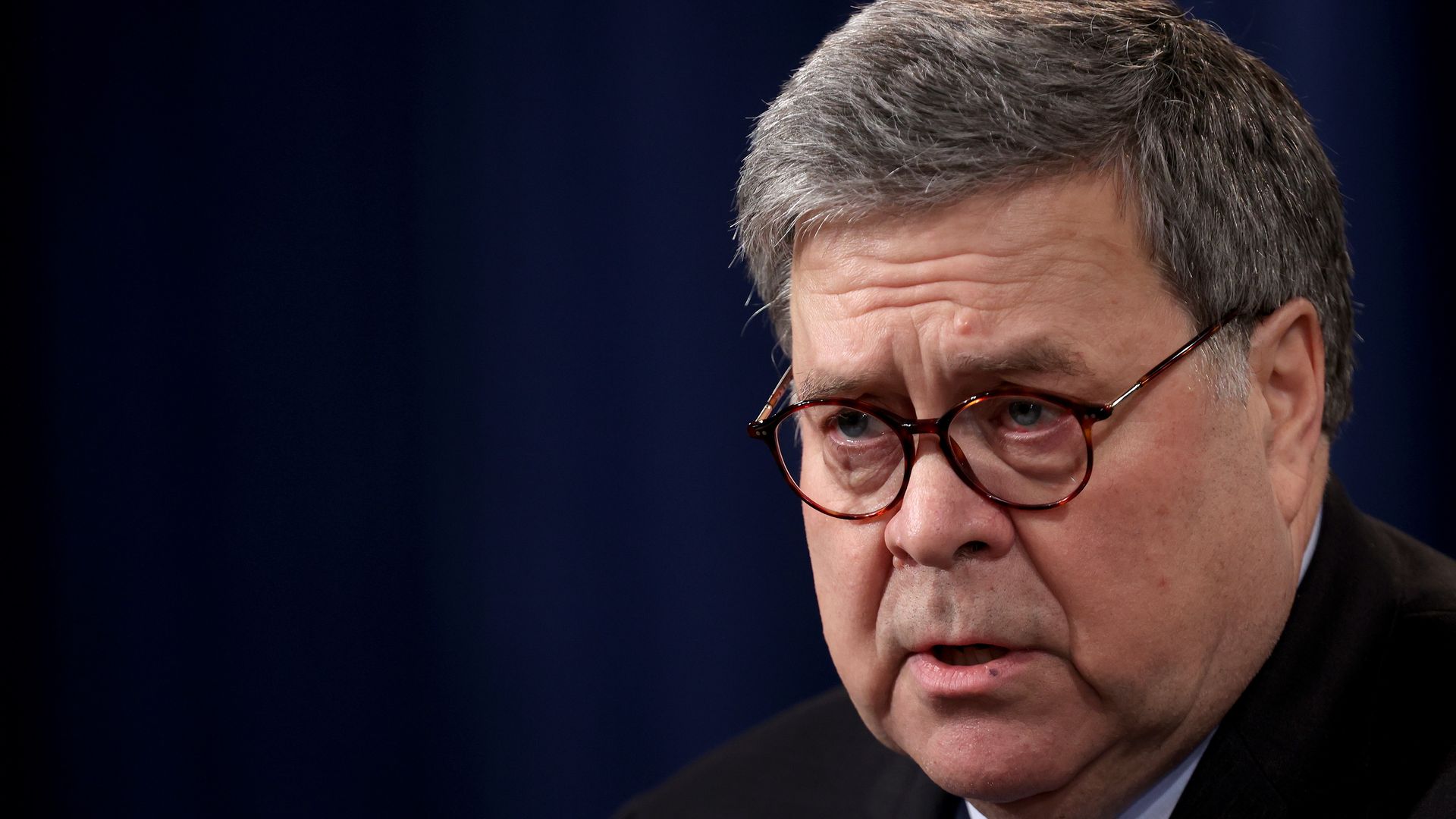Barr scoffs at White House's anti-Huawei 5G approach
Add Axios as your preferred source to
see more of our stories on Google.

Attorney General William Barr. Photo: Win McNamee/Getty Images
Attorney General William Barr on Thursday dismissed a new White House-led effort to build 5G using homegrown equipment and said the government should instead consider investing in Nokia or Ericsson to counter the threat of Huawei dominating the next-generation networks.
The big picture: While the Trump administration broadly agrees about the need to develop a clear and cohesive 5G policy and keep Chinese equipment out of the forthcoming networks, there has been widespread disagreement about how to get there.
Driving the news: Barr, a former Verizon executive, said the U.S. must move quickly to make critical 5G-friendly airwaves available for commercial use, and must have a viable alternative supplier to Huawei.
He also poured cold water on recent reports of a new approach by the White House to 5G networks that see the government coordinate with U.S. companies to develop open software that could run on nearly any standard hardware.
- "The problem is that this is a pie in the sky," Barr said. "This approach is completely untested and would take many years to get off the ground, and would not be ready for prime time for a decade, if ever."
Details: Barr said instead of trying to build a whole new 5G architecture from scratch, the U.S. should work with Nokia and Ericsson.
- They're the only companies that can compete with Huawei as 5G infrastructure suppliers, Barr said, but they lack the Chinese telecom giant's scale and the backing of a powerful country with a large market.
- Nokia and Ericsson would be more viable competitors against Huawei with U.S. backing, Barr contended, through American ownership of a controlling stake, either directly or through a consortium of private companies.
What they're saying:
- "Putting our large market and financial muscle behind one or both of these firms would make it a far more formidable competitor and eliminate concerns over its staying power," Barr said in a speech at the Center for Strategic & International Studies. "We and our closest allies certainly need to be actively considering this approach."
- “The US Government has become consumed by politics when it comes to 5G and Huawei, there’s no need for so much uncertainty or worrying about catching up," Huawei spokesperson Glenn Schloss said. "If the U.S. wants 5G hardware and software developed by a U.S. or European company, the government should encourage companies to begin negotiations with Huawei to license our 5G technology."
Barr also seemed to be at odds with the Pentagon and the Commerce Department over the path forward on a stalled proposal to use airwaves for an industrial-focused 5G network.
- Ligado, formerly known as LightSquared, has been pushing for years to be granted permission to use satellite frequencies to build a network for Internet of Things devices. But it's faced opposition from Defense and Commerce over fears its proposal would harm GPS signals.
- Without naming any companies, Barr said putting the spectrum to commercial use could help speed 5G deployment and urged the Federal Communications Commission to resolve the issue.
- Barr overlapped at Verizon with then-CEO Ivan Seidenberg, now the chairman of Ligado's board.
Context: The Trump administration's approach to 5G already has featured several inter-agency spats.
- There was opposition both internally from the FCC and wireless industry on previous proposals to either nationalize 5G or build a privately run but government-backed wholesale network all players could use.
- The FCC has also feuded with Trump administration agencies, including the Commerce Department, on plans to repurpose airwaves for 5G.
"It’s becoming clear as day that when it comes to planning for our 5G future, in this administration the right hand is not talking to the left. We have yet to coordinate our 5G strategy across the government."— Democratic FCC Commissioner Jessica Rosenworcel
One area of agreement: the importance to 5G development of midband spectrum, which sits in a sweet spot between low frequencies, which can go great distances but can't carry large volumes of data, and high frequencies that can pack in a lot of data but can't travel far.
- Barr called it "critical" for the FCC to get a swath of airwaves known as the C-band to market through an auction in the next few months.
- A few hours later, in a speech of his own, Chairman Ajit Pai announced the C-band auction would begin Dec. 8.
- The FCC's deliberations over how to repurpose the airwaves, currently held by satellite companies, for 5G have been politically fraught.
- Pai said his plan, up for a vote at the commission's next meeting Feb. 8, would make the satellite companies eligible for $9.7 billion in payments from winning bidders if they relinquish their airwaves ahead of schedule.
